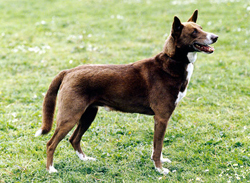Canaan Dogs are medium-sized dogs with a square build. Their coat comes in two color patterns, the first of which is predominantly white with a mask and comes with or without color patches. The second color pattern is solid colored with or without white trim. Canaan Dogs have a short, flat-lying double coat. The outer coat is straight, hard, and flat-lying, and it's medium-length on the body but shorter on the head and front of the legs. The undercoat is soft and short, and its density varies by climate.
Today, these dogs are often seen in obedience, agility, herding, and conformation arenas. They are also found working in search and rescue and as therapy dogs.
These dogs have a wedge-shaped head, low-set ears, and dark, almond-shaped eyes. Their tail is bushy. Canaan Dogs measure 19 to 24 inches tall at the shoulder and weigh 35 to 55 pounds. With proper care, these devoted and gentle dogs can live up to 14 years.
Many years ago, the breed was used as messenger dogs. People quickly realized, however, that the Canaan Dog's territorial nature interfered with their work. These dogs would only deliver messages up to 1,000 meters away before turning around and returning to their home.
Canaan Dogs are inquisitive, loving, and loyal, and they make great pets for families with children. They also tend to get along decently with cats and other dogs, provided they are raised together. This breed is warm and affectionate with their human family members, but they are aloof and reserved with strangers. This, combined with their territorial nature, makes them good watchdogs.
This is not a needy breed; Canaan Dogs typically check in on their family periodically to make sure everything is fine, but then they go about their business. They are independent, confident, and easily bored, and they benefit from puzzle toys and other sources of mental stimulation. They prefer to be kept busy and enjoy being given chores to do.
A fairly active breed, Canaans like long walks and jogging. They need time for exercise every day, but they are fine in apartments as long as they receive scheduled outside time regularly. If bored or neglected, these dogs may become depressed or excessively vocal.
Canaan Dogs are one of most healthy breeds around, and these dogs suffer from very few genetic problems. Of course, this does not guarantee that any individual dog will be free of health problems or genetic conditions. Verifying that the family line is healthy before purchasing or adopting, choosing a healthy puppy, and keeping current on wellness checks will help prevent health problems from developing.
Epilepsy and hypothyroidism are two health conditions known to affect this breed. Both of these problems are treatable with medication, and most dogs diagnosed with one of these conditions will live a long, active, and full life. Canaan Dogs are also at risk for obesity, but this is a highly preventable condition. Close monitoring of portion sizes and encouraging these dogs to regularly engage in physical activity will prevent most cases of obesity.
With routine veterinary care, timely vaccinations, and weight management, Canaan Dogs typically live 12 to 14 years.
Intelligent dogs, Canaans are easily trained and learn commands and rules quickly. They respond best to positive reinforcement techniques, such as praise and treat rewards, and they do best when sessions are kept short and fun. These dogs bore easily; training cannot be repetitive. If training is not consistent, this breed will quickly take advantage of any loopholes in the rules.
Early socialization is important to produce well-adjusted, tolerant, and confident dogs. Proper training and socialization will also help prevent fearfulness and an overly suspicious nature in these dogs.
Due to their independent nature and occasional attitude problem, Canaan Dogs may be difficult for first time dog owners to handle. In these cases, a professional trainer may be necessary to guide the training session.
The Canaan's short double-coat needs minimal grooming. Brushing with a rubber curry brush or hound mitt will remove loose hair and distribute skin oils to keep the coat shiny and healthy. During spring and fall shedding seasons, more frequent brushing will minimize the amount of hair that ends up on furniture and clothing. Brushing these dogs outdoors is recommended.
Canaan Dogs need bathing only if they've rolled around in something stinky, sticky, or dangerous. Otherwise, brushing is sufficient to remove most dirt picked up by the coat. When bathing is necessary, it's important to use a gentle, pH-balanced shampoo designed for use on dogs. Human shampoos are irritating and drying to canine skin.
The nails should be trimmed every few weeks, or more often if needed, and the ears should be cleaned every week or so. Regular dental care, which includes routine examinations, regular brushing, and the use of dental treats, protects the teeth and gums.
This breed is the natural breed of Israel and was called Kelef Kanani, which is Hebrew for Canaan Dog. These dogs date back to Biblical times, and they get their name from the Land of Canaan, which is where they originated. They were guarding and herding dogs of the ancient Israelites, and were used to guard their flocks and camps.
After the Romans came to the Israel, the breed became feral, living in southern Israel and traveling around the land. They remained wild for many years. In anticipation of Israel's War of Independence and the Second World War, a man by the name of Dr. Rudophine Menzel trained hundreds of Canaan Dogs to work as mine detectors for the forces in the Middle East. The dogs quickly proved to be superior to mechanical detectors.
Ursula Berkowitz of California imported four Canaan Dogs in September, 1965 in order to establish the breed in America. Today, these dogs are often seen in obedience, agility, herding, and conformation arenas. They are also found working in search and rescue and as therapy dogs.
The American Kennel Club officially recognized the Canaan Dog in 1997.

